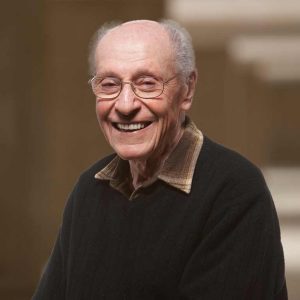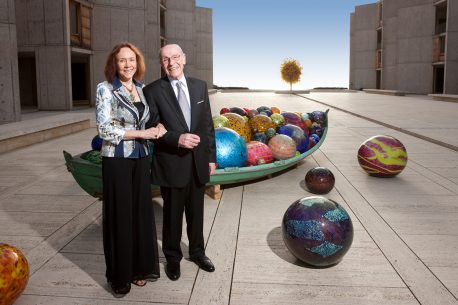
October 24, 2018
LA JOLLA—Salk Professor Melvin Cohn, titan of immune system biology and a pioneering researcher in the field of gene regulation, passed away on October 23, 2018, in San Diego, California, at the age of 96.

Click here for a high-resolution image.
Credit: Salk Institute
“Mel Cohn has been a mainstay of the Institute since its very first days,” says Salk President Rusty Gage. “He has stood with Salk through its entire history and all of us will miss his presence and his wisdom. His work in the field of immunology and his impact on Salk are both profound and influential. Throughout his career, Mel showed an incredible ability to adapt to the dynamic needs of the field of science. We are fortunate to have his innovative example to follow as we continue seeking new ways to understand ourselves and the world we call home.”
Cohn joined Salk in 1961 as a founding and resident fellow, with his wife and fellow researcher Suzanne Bourgeois-Cohn, at the personal request of Jonas Salk, discoverer of the first effective polio vaccine. Cohn held a faculty appointment with neighboring UC San Diego for more than 30 years. Prior to joining Salk, Cohn was a National Science Foundation fellow at l’Institut Pasteur in Paris and was previously a professor at Stanford University and Washington University in St. Louis. He was named a professor emeritus of Salk in 2011 and maintained an active research group until shortly before his passing.
“Mel was working on a new paper just yesterday. He was a dedicated, active scientist until the day he died,” says Bourgeois-Cohn. “Mel helped to make Salk what it is today. He was a giant in the field of biology and a wonderful person. I and his many friends will miss him terribly."
In the field of gene regulation, Cohn worked with Nobel Laureate Jacques Monod on seminal research describing the E. coli lac operon, a set of genes that encode proteins to break down lactose (sugar). This research laid the foundations for better understanding how genes are turned on and off, work that would go on to be recognized with Monod’s 1965 Nobel Prize.
At Salk, Cohn studied the body’s immune response, which protects vertebrates from the lethal effects of pathogens. After nearly a decade of working in the field of enzyme regulation, he turned to the problem of antibody synthesis. While the immune system cannot predict which of the diverse array of pathogens it will encounter, it nevertheless must respond promptly to defend the host organism from invaders. Cohn’s investigations were largely theoretical and dealt with the evolutionary selection pressures that shape the immune system, contributing to an understanding of humans’ evolution and defense mechanisms.
To this end, Cohn established a mouse myeloma (cancer) library that contained lines of cells that could be manipulated in tissue culture. With this library, Cohn and his team were able to prove the somatic hypermutation model of antibody synthesis—the idea that immune cells/antibodies mutate in direct response to infection and exposure to pathogens in order to fight disease. A byproduct of Cohn’s work was numerous antigen-presenting cell lines, macrophages and reticular cells for a wide number of diseases. These important lines are still being maintained.
Later in his career, Cohn pioneered the use of computerized models to predict immune behavior. With colleagues, he created a computer simulation of immune responses to better understand a variety of biological responses. Cohn used this technology to explore neurobiology and aspects of autoimmunity and immune responses to cancer.

Click here for a high-resolution image.
Credit: Salk Institute
Cohn was born in Manhattan in 1922, the grandson of Russian émigrés who sought to escape the Romanov Empire’s brutal pogroms of the late 19th century. His parents both graduated from Brooklyn Law School in 1918; his mother was one of New York’s first female lawyers. Cohn would go on to earn a bachelor’s degree in physics in 1940 from the City College of New York. Despite studying physics, Cohn always had an interest in chemistry and would go on to earn a master’s in colloid chemistry from Columbia University in 1941. With the outbreak of World War II, Cohn was drafted into the US Army, completing his basic training at Fort Dix, New Jersey. As a member of the 26th Medical Company, Cohn served in the Pacific Theater as a clinical laboratory researcher and, briefly, a military police officer. Cohn would attain the rank of technical sergeant before his service concluded and prior to returning home he was tasked with studying the effects of radiation on the people of Hiroshima following Japan’s capitulation. When he arrived in New York, he set out to earn his PhD and completed his doctoral studies in protein biochemistry at New York University. Following the completion of his PhD, Cohn would hold a number of appointments. It was while he was a research fellow at l’Institut Pasteur in Paris in late 1961 that he would meet Suzanne Bourgeois, the woman he would go on to marry and remain with for the rest of his life.
Professionally, Cohn was a highly regarded expert in immunology. In addition to providing many keynote lectures at various symposia and being a member of numerous academic and research societies, Cohn was widely acclaimed for his research. His awards included the Sandoz Prize in Basic Immunology and the Eli Lilly Award in Microbiology and Immunology, as well as election to the American Academy of Arts and Sciences and an honorary membership in the Scandinavian Society for Immunology. Cohn was also instrumental in founding the annual La Jolla Immunologists Meeting in 1964. He published more than 300 peer-reviewed articles in many prestigious journals over the course of his career, some as recently as 2018.
Cohn is survived by his wife, Suzanne Bourgeois-Cohn, a professor emerita at Salk and a highly respected researcher as well as the author of the book Genesis of the Salk Institute: the Epic of its Founders (University of California Press, 2013).
Office of Communications
Tel: (858) 453-4100
press@salk.edu
Unlocking the secrets of life itself is the driving force behind the Salk Institute. Our team of world-class, award-winning scientists pushes the boundaries of knowledge in areas such as neuroscience, cancer research, aging, immunobiology, plant biology, computational biology and more. Founded by Jonas Salk, developer of the first safe and effective polio vaccine, the Institute is an independent, nonprofit research organization and architectural landmark: small by choice, intimate by nature, and fearless in the face of any challenge.